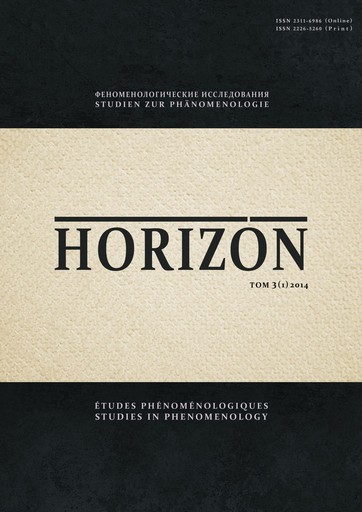TRANSZENDENTALER SCHEIN UND PHÄNOMENOLOGISCHE
URSPRÜNGLICHKEIT — WELTERFAHRUNG BEI HUSSERL UND FINK
TRANSCENDENTAL ILLUSION AND PHENOMENOLOGICAL
ORIGINALITY — THE WORLD-EXPERIENCE IN HUSSERL AND FINK
Author(s): Yoshiko IkedaSubject(s): Phenomenology
Published by: Издательство Санкт-Петербургского государственного университета
Keywords: transcendental illusion; transcendental idealism; intentional correlation; worldexperience; origin of the world; access to time-horizons; event
Summary/Abstract: This paper holds that the philosophical relation between Husserl’s and Fink’s phenomenologicalphilosophies can be characterized in terms of proximity and distance. We proceed byfocusing on the philosophical foundation of their projects and, in particular, on the Kantiannotion of “transcendental illusion”, which they use, though in different manners, as a wayof determining purely philosophical illusions — a preliminary task to found transcendentalphenomenology proper. We select this Kantian notion as a central theme inasmuch as itconcerns the metaphysical problematic of the world. Our analysis shows that Fink defendsthe Husserlian thesis that the world is not merely an “idea of pure reason” (Kant), but anexperience. In effect, the world is necessarily pregiven to us, though anonymously, in anintentional experience; in other words, intentional experience without the pregiven worldis, according to the late Husserl, unthinkable. Fink’s characterization of world-experience isradically different from Husserl’s. This difference or distance comes from Fink’s conceptionof “enworlding” (Verweltlichung), i. e., the self-actualization of constituting subjectivity inthe world-actualization. Fink’s very idea of this type of correlation has two specific enablingfunctions: (1) the world’s originally enframing function (die ursprünglich einrahmende Funktion)of the entity into the world itself and (2) the event-like character of the “intruding” (Eindringen)of the subject into the world. Therefore, we conclude that Fink’s phenomenologicalcontribution to philosophy consists not only in his genuine reflection on, and analysis of, thephenomenological conception of correlation at the deep level of world-experience, but alsoin his metaphysical reformulation of the traditional concept of the world.
Journal: Horizon. Феноменологические исследования
- Issue Year: 3/2014
- Issue No: 1
- Page Range: 60-92
- Page Count: 33
- Language: German

